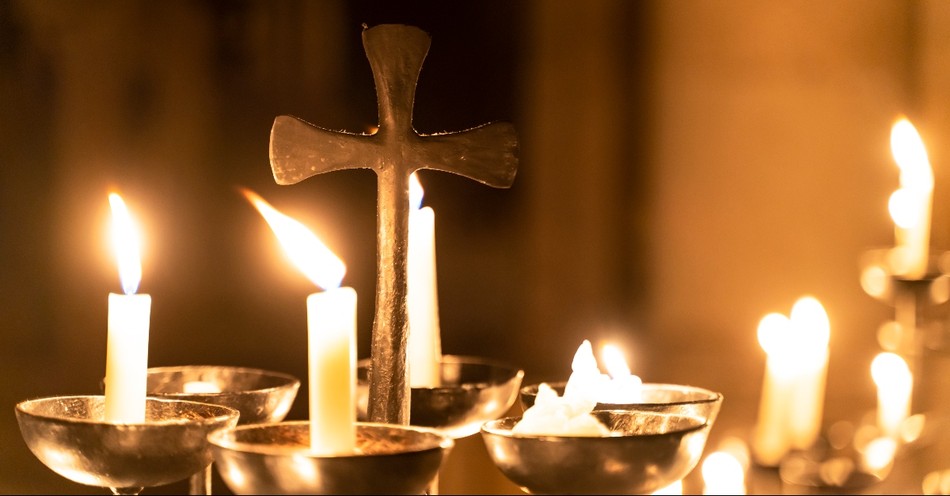If you didn’t grow up with a Catholic background or had family members who did or haven’t had a chance yet to study church history, you may have never heard of something known as the Filioque Controversy.
This Latin word meaning “and from the Son” had caused so much division in the early church that it led to the split between the Roman Catholic Church and the Eastern Orthodox tradition in AD 1054.
Where did this controversy arise, and how can one Latin phrase split an entire church into two?
In this article, we’ll dive into both sides of the filioque controversy. Because this remains a controversy, we will not be able to fully form an answer to whether the Holy Spirit proceeds from the Father or the Father and the Son (more on this in a moment). We’ll also lightly touch on the importance of the knowledge of church history and the schisms that have occurred over the years.
What Are the Two Sides of the Filioque Controversy?
The Trinity is already a tough concept to wrap our brains around, and it divided the church for centuries as they attempted to define the three-in-one concept.
But a new controversy arose in regards to something known as the Nicene Creed.
In particular this line:
“And we believe in the Holy Spirit, the Lord, the giver of life. He proceeds from the Father and the Son,”
Certain traditions do not contain “and the Son.” The split happened as to whether the Holy Spirit proceeded (came out of) just the Father or both the Father and the Son. The Nicene Creed was adopted by the Council of Nicea in AD 325, but we don’t see this controversy reach its full effect until several centuries later. The controversy mostly took place with the addition (or some argue that the phrase was in there all along) of “and the Son.”
As entire books and centuries of debate have surrounded this topic, we can in no way cover that breadth in a 1000-word article. But we can provide an overview of both sides of the schism.
1. The Holy Spirit Just Proceeds from the Father (and Not the Son)
No doubt, Scripture makes it clear that the Father plays a role in the procession of the Holy Spirit. We see this in verses such as John 15:26 and Matthew 10:20. These verses explicitly state that the Holy Spirit proceeds from or comes from the Father.
This side of the controversy, the Eastern Tradition, will argue that there doesn’t seem to be Scriptural support for the Holy Spirit proceeding from the Son as well.
We may wonder, “Okay, that seems a bit nitpicky. Why can’t they just change a few words in the Creed?” But, as this article states, those from the Eastern tradition believe that adding in the filioque clause disrupts the balance of the three persons in the Trinity and even changes the entire nature of God. If the Holy Spirit proceeds from both the Father and the Son, there’s no unique role in the Father of the Trinity. Each person of the Trinity, as the article argues, has a distinct role and purpose.
If two people share the same role, and one person doesn’t, doesn’t that, in some way, make those two people in the godhead, somehow, more superior to the one who doesn’t have that role (as argued in the article)?
2. The Holy Spirit Proceeds from Both the Father and the Son Controversy
The western tradition (Roman Catholic and Protestant) asserts this position.
This side argues that although we may not have explicit Scriptural support for the Holy Spirit also proceeding from the Son, that we have some verses that can imply that, such as John 16:7 and Galatians 4:6.
This side of the controversy will also argue that because the Spirit’s role appears more entwined with that of Christ, that this gives Christ’s role in our lives more meaning. And that it’s just as important to see the distinctions of the Trinity as it is to see all the three parts of the Godhead working together for a singular purpose, to bring people closer to God.
Why Does This Matter?
Of course, with both sides of this controversy, it remains that: A controversy. One cannot properly in an hour’s time of writing come up with a solution to a debate that has lasted more than a millennium.
We should care about this debate, however, because it caused the first major division in the church. If we meet a brother or sister in Christ who lies on the other side of the debate, if we have a basic knowledge of this schism, we can have a better understanding of how this controversy influences their beliefs and how they worship.
It’s also important to challenge our own thinking. No matter whether we are of the eastern or western tradition, we should always exercise discernment and turn to Scripture when we encounter controversies such as this one.
We should also bear in mind that God is incredibly complex, and He will have certain mysteries that we will perhaps never be able to unravel such as the incarnation, and perhaps, the procession of the Holy Spirit.
Photo Credit: ©iStock/Getty Images Plus/BulentBARIS
Hope Bolinger is an acquisitions editor at End Game Press, book editor for hire, and the author of almost 30 books. More than 1500 of her works have been featured in various publications. Check out her books at hopebolinger.com for clean books in most genres, great for adults and kids. Check out her editing profile at Reedsy.com to find out about hiring her for your next book project.



